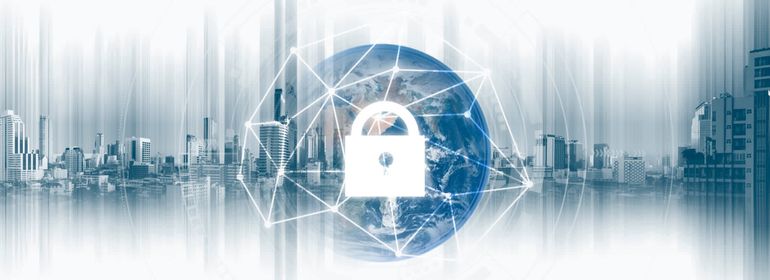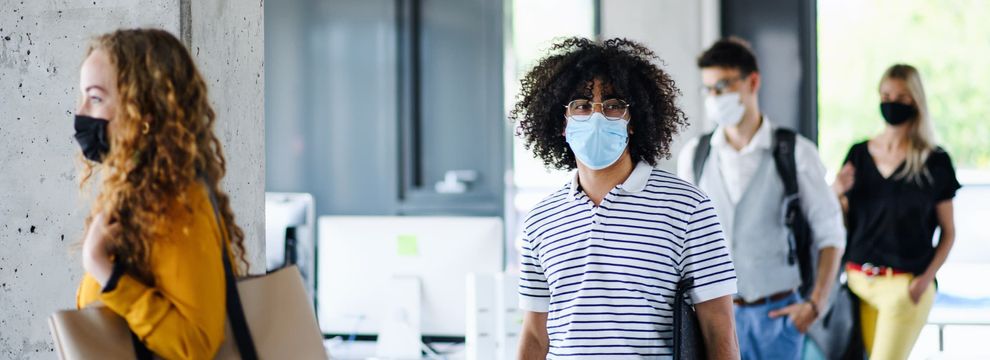Swiftlane Health Check provides secure tools for reopening offices quickly and safely. From self-temperature checks, capacity planning, staggered schedules, and PPE allocation and inventory management, Swiftlane Health Check gives companies the resources to move forward and implement a safe return to workplace.
In this interview with Swiftlane CEO and Founder Saurabh Bajaj, we discuss the features and solutions of Swiftlane Health Check, how Swiftlane is prioritizing privacy, and the changing roles of HR and workplace teams.
What are the trends you’re seeing around health tracking?
Saurabh Bajaj: Companies are trying to reopen and they’re seeing a lot of products that do temperature checks. A lot of articles suggest that they should be doing temperature checking when someone comes in for both employees as well as guests, but there’s a lot of issues around temperature checking.
Temperature checks can be done two different ways. One is physically having someone hold a temperature gun and perform a check at the office door. Those are very error prone because those guns have poor accuracy ratings, which are not good enough for reliably testing someone for a health check or for fevers. Secondly, there’s a lot of variation and errors in measurement of temperature, based on what part of the face the gun is pointing at.
It’s the same problem with temperature kiosks. Expensive temperature checking kiosks ($3,000 to $5,000) are being installed at the office entrance so that people can step on it before coming in and have their temperature checked. But there is expert guidance that the temperature near your eyelids is probably the most accurate place to measure fever. So the biggest issue is a lot of these systems lack the ability to focus on a certain place on the face.
What do you think are the top priorities for enabling a safe return to work?
I think the number one priority is safety of employees, and also preventing virus spread in the office and having a clear plan around a few critical areas.
First is maintaining social distancing — making sure that there’s no overcrowding happening in the office.
Second is ensuring that sick people stay at home and don’t come in.
Third is having up-to-date communication guidelines on what to do in case of any issues that arise.
When it comes to social distancing, just spreading out desks or buying more real estate is not a solution. Real estate is one of the big line items for a company’s cost, and it’s not practical or affordable to just double the amount of real estate. So the best way to implement social distancing is to set up staggered schedules. This way you can plan to get people back into the office and avoid overcrowding, while using the exact same amount of space you have today.
What are the increasing concerns around privacy and health tracking?
Privacy is taking a big hit in this market. It’s really horrible because now there are companies that are selling beacons and tracking systems, requiring employees to download apps that are monitoring their location in the office.
They are highly error prone and also violate a lot of privacy of the employees and people inside the office.
And they’re not really thinking through some of those liability and compliance implications of that. This is something we’ve put a lot of work and thought into in order to maintain very high privacy around how we do health checks. We basically avoid storing 99% of the data and just keep track of whether someone has failed or passed a check.
I think companies should try to consider implications of background monitoring apps as they think about launching any of those apps in terms of privacy and backlash from employees. It’s going to cause a lot of tension to their employees who might feel tracked and vulnerable.
How does Swiftlane protect data and privacy?
First, our product allows for setting up employee self health checks at home to eliminate the need to line up at the door at the office. Lining up at the office entry has a negative effect on maintaining social distancing and can cause bottlenecks in entering and moving between office spaces. Swiftlane Health Check provides the ability for employees to take a digital version of the same survey that companies are doing on paper forms.
Second, we ensure the highest privacy when it comes to data. We don’t store any health records on our servers; we only store whether someone successfully passes or fails that health check, based on their own self attestation. This provides a very strong privacy model around the product and eliminates any liability issues that might arise for the employers who are setting up these health checks. Its also follows the best practices laid out by CDC and OSHA around what those checks should look like so companies can ensure they are compliant with how health checks should operate.
And finally, and probably most importantly, our product operates in a privacy first manner by allowing self home checks. This empowers employees to have a better sense of control over the process. And, operationally it reduces risk to office managers and front desk personnel who run the risk of being exposed to contagions.
What other features does Swiftlane Health Check provide?
We’ve built tools to control and limit capacity with a product that offers capacity alerts so employers can set limits on how many people can be in the office. This solves for maintaining social distancing and avoiding overcrowding.
We also provide a single centralized place to send out any COVID-19 alerts. The platform allows employers to create staggered user schedules, so employees know when they are supposed to come into the office.
Our system allows companies to manage inventory and allocation of their PPE equipment – masks, shields, and gloves. It’s critical to ensure all employees and at-risk personnel have the PPE needed to stay safe and healthy. The PPE management system helps track of all this info rather than having to struggle to find out how the allocation is being assigned through a spreadsheet or log.
Can companies cut costs by using Swiftlane?
There is a huge cost in having people standing at the door all day long, measuring temperature, and there are huge operational costs for multiple entrances. You need people at every entrance, or you can create bottlenecks in the flow of people, resulting in a productivity loss.
Crowding people in a common entry area means there’s also more risk of exposure as a side effect of implementing safety protocols. So these are all considerations to keep in mind. And I think that adds to the cost as well as friction. And it does not solve for other requirements that companies need to undertake to prevent liability.
On top of it, you need to invest in procedures and protocols. So companies need to think of the overall cost of running this operation while evaluating products.
How has the role of HR and workplace managers changed since COVID-19?
I think a lot of the workplace managers have always worn many, many hats. Traditionally, they had to manage setting up the office kitchen, managing access control, running day-to-day operations, and facility management.
But now safety has become a critical and central focus in defining the return to work plans for companies. HR, security, facilities, and workplace have to come together to figure out a comprehensive strategy that prioritizes health and safety. There’s no playbook for that, which is why so many companies are struggling to find the solutions they need to find a way forward. Swiftlane Health Check helps solve many of the issues around returning to work safely.




